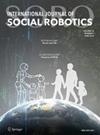在游戏化机器人演习中使用热成像和光学成像的多模态影响检测
IF 3.8
2区 计算机科学
Q2 ROBOTICS
引用次数: 0
摘要
情感识别,或检测和解释情绪状态的能力,有可能成为医疗保健领域的一个有价值的工具。特别是,它可以在游戏化治疗中发挥作用,这涉及到使用游戏技术来激励和保持患者参与治疗活动。本研究旨在检验在游戏化机器人治疗场景中使用热成像和动作单元数据进行情感分类的机器学习模型的准确性。一项自我报告调查和三种机器学习模型被用来评估参与者在游戏不同阶段的情绪,包括沮丧、无聊和享受。结果表明,基于LSTM模型的多模态热成像与动作单元相结合的方法在7-s滑动窗口内的情绪分类准确率最高,达到77%,而热成像的标准偏差最低。结果表明,热成像和动作单元可以有效地检测情感状态,并且可能有潜力用于医疗保健应用,如游戏化治疗,作为一种有前途的非侵入性方法来识别内部状态。本文章由计算机程序翻译,如有差异,请以英文原文为准。

Multi-modal Affect Detection Using Thermal and Optical Imaging in a Gamified Robotic Exercise
Abstract Affect recognition, or the ability to detect and interpret emotional states, has the potential to be a valuable tool in the field of healthcare. In particular, it can be useful in gamified therapy, which involves using gaming techniques to motivate and keep the engagement of patients in therapeutic activities. This study aims to examine the accuracy of machine learning models using thermal imaging and action unit data for affect classification in a gamified robot therapy scenario. A self-report survey and three machine learning models were used to assess emotions including frustration, boredom, and enjoyment in participants during different phases of the game. The results showed that the multimodal approach with the combination of thermal imaging and action units with LSTM model had the highest accuracy of 77% for emotion classification over a 7-s sliding window, while thermal imaging had the lowest standard deviation among participants. The results suggest that thermal imaging and action units can be effective in detecting affective states and might have the potential to be used in healthcare applications, such as gamified therapy, as a promising non-intrusive method for recognizing internal states.
求助全文
通过发布文献求助,成功后即可免费获取论文全文。
去求助
来源期刊

International Journal of Social Robotics
ROBOTICS-
CiteScore
9.80
自引率
8.50%
发文量
95
期刊介绍:
Social Robotics is the study of robots that are able to interact and communicate among themselves, with humans, and with the environment, within the social and cultural structure attached to its role. The journal covers a broad spectrum of topics related to the latest technologies, new research results and developments in the area of social robotics on all levels, from developments in core enabling technologies to system integration, aesthetic design, applications and social implications. It provides a platform for like-minded researchers to present their findings and latest developments in social robotics, covering relevant advances in engineering, computing, arts and social sciences.
The journal publishes original, peer reviewed articles and contributions on innovative ideas and concepts, new discoveries and improvements, as well as novel applications, by leading researchers and developers regarding the latest fundamental advances in the core technologies that form the backbone of social robotics, distinguished developmental projects in the area, as well as seminal works in aesthetic design, ethics and philosophy, studies on social impact and influence, pertaining to social robotics.
 求助内容:
求助内容: 应助结果提醒方式:
应助结果提醒方式:


